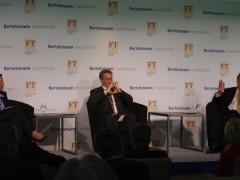INCRA: How to Creditably Rate Sovereign Risk


Annette Heuser (Executive Director of Bertelsmann Foundation and lead for the Blueprint for INCRA), Rolf Langhammer (Kiel Institute for the World Economy), and Vincent Truglia (former Managing Director, Moody's) / Photo by Michael Carbone
Surrounded by real world examples of conflicts of interest by “Big Three” for-profit credit rating agencies–Standard & Poor, Moody’s, and Fitch, the Bertelsmann Foundation unveiled the blueprint for a hypothetical international nonprofit credit rating agency (INCRA) on April 19th at the climax of the Bertelsmann Foundation – Financial Times Conference held at the Newseum in Washington.
This is not the first time alternative credit rating agencies have been proposed. Both India and China created their own credit rating agencies, and the European Commission proposed a European credit rating agency in the wake of the financial crisis. Dissatisfaction has spread to the extent that even an open-source credit rating platform called Wikirating has been created.
The “Big Three” agencies control 95% of the market and have taken significant flak for mispricing debt for their own gain. The three credit rating agencies follow business models that introduce a large potential for conflicts of interest. In their “issuer-pays” business model, the issuer of a bond to be rated pays the credit rating agency to be rated, providing an incentive for the issuer to seek out the agency most likely to provide the highest rating. Because there are at most three main credit rating players (S&P and Moody’s together represent 80% of the market), this provides an incentive for the agencies to compete to provide a higher rating.
In addition, for complicated structured financial transactions such as collateralized debt obligations (CDO) with different layers or “tranches” of risk, these large credit rating agencies provide advisory services on how issuers can package the tranches to achieve a desired rating, obscuring the risk of default in high-return CDOs compared to similarly rated corporate bonds with lower returns. This led many investors to view CDOs as better buys, unaware that unlike other bonds, CDOs were strongly intertwined with the risky subprime mortgages that ultimately went under.
The Bertelsmann Foundation’s proposal is unique in positioning itself as a nonprofit sovereign credit rating agency, an attempt to neutralize the perceived conflicts of interest in for-profit credit rating agencies. With an initial endowment of US$400 million, the international nonprofit credit rating agency (INCRA) would not be self-sustaining, instead needing to find additional sources of income. In the blueprint laid out on 19th, these sources include corporations (who would find quality ratings important to their investments), civil society groups such as NGOs or private foundations, international organizations or supranationals such the IMF and the European Central Bank, and governments.
It is that last source of funding that seems so out-of-place. The nonprofit status of INCRA was meant to be a protection against the type of conflicts of interest or perceptions of conflicts of interest that made so many countries and investors lose confidence in the Big Three. Why then would the Bertelsmann Foundation and its team of advisors introduce such a potential issue? The organizational firewalls installed to prevent any conflicts of interest seem severe, with a Stakeholder Council providing a buffer between the funders and the organization’s operations, but through the Council funders supervise the Management Body, which does conduct the organization’s operations.
Additional measures were offered to prevent any undue influence by governments, but there seems to be little reason to keep the funding option open when the primary goal of INCRA in the first years of its existence is to build a solid reputation of institutional independence and quality. Furthermore, the potential income from government is not needed for the agency. Vincent Truglia, one of the expert contributors to the blueprint and former managing director of the sovereign risk division at Moody’s, noted that the $400 million initial endowment could easily come from two or more private foundations, without the need for government funding and the tremendous complications to reputation and governance it entails.
By seeking or generating no income from the subject of its ratings, the Bertelsmann Foundation can ensue that INCRA is known from the start to be a truly different type of credit rating agency.
